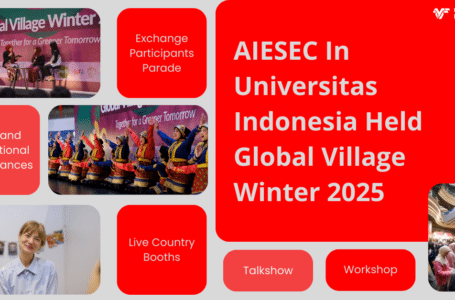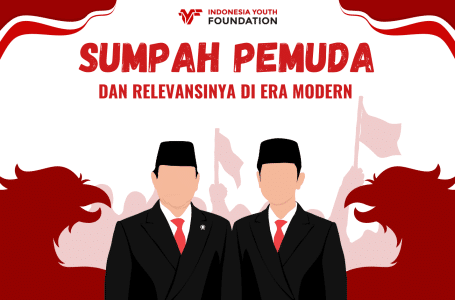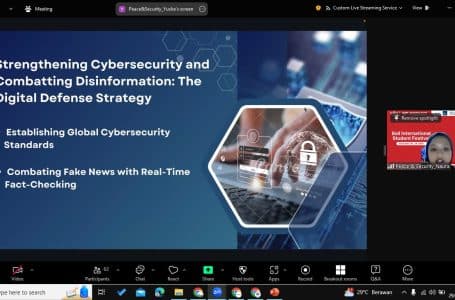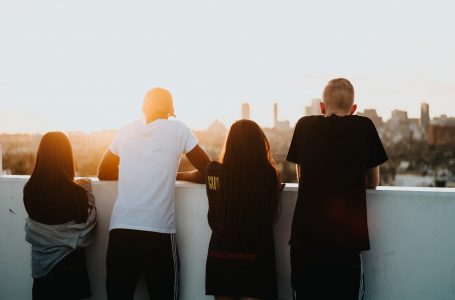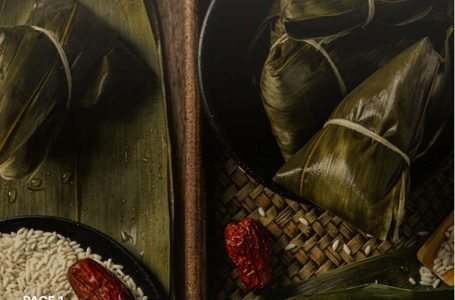AIESEC In Universitas Indonesia Held Global Village Winter 2025
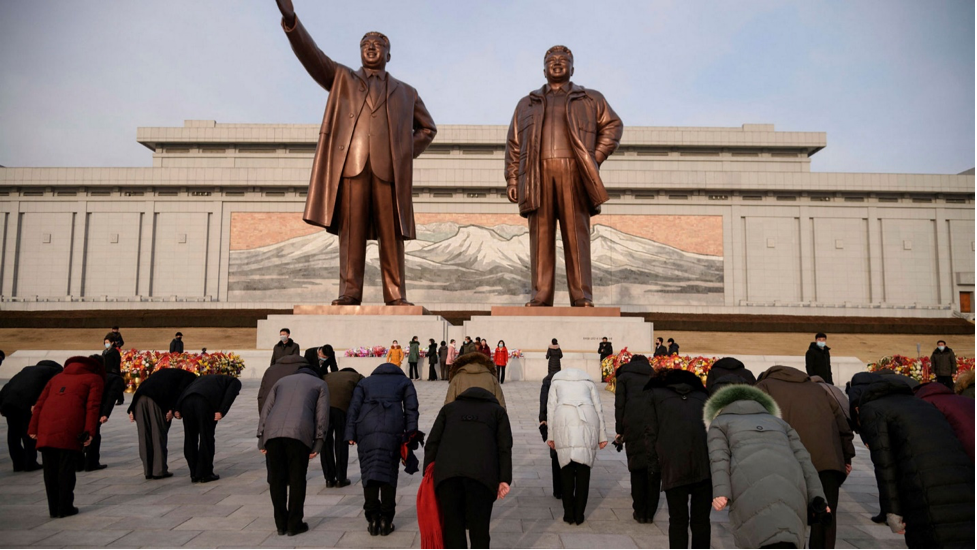
By Oh Gyeong Jin, Fauzi Wahyu Zamzami
North Korea has attempted non-alliance diplomacy with third-world countries. Indonesia, Malaysia, Pakistan, Syria, Kuwait, Nigeria, and others have made friends with North Korea. In 1975, North Korea unanimously joined the Non-Aligned Movement (NAM) and pursued diplomatic cooperation with third-world countries, particularly through deepening relations with its key country, Indonesia (Hyung-jong, 2018).
Rooted in the legendary friendship between the founders of the two countries, Indonesia has bucked the global trend imposed by UN, UN sanctions, and sought to fill the diplomatic void by extending a helping hand (Poetri, Govindasamy, & Akhir, 2018).
The relationship between North Korea and Indonesia began with the Soekarno regime. They established diplomatic relations at the ambassador level in 1964. In April 1965, Kim Il-sung visited Jakarta with Kim Jong-il to obtain an honorary doctorate (Jin-young & Hyuk-sang, 2019).
For Kim Jong-il, it was his first diplomatic tour. North Korea is the first non-public country to make an official visit to Indonesia. It was also North Korea’s first visit to a non-socialist country, in the form of a return visit to North Korea by Colonel Soekarno in January 1964. At that time, Colonel Soekarno presented Kim Il-sung who visited the Bogor Botanical Gardens, with flowers named Kim Il-sung, which is often seen on North Korean national days. It was shipped to
Pyongyang in 1975 and introduced to North Korea for the first time in April 1977, Kim Il-sung’s 65th birthday. The Kim Il Sung orchid has become a powerful and beautiful symbol in North Korea, which until recently has often been prominently featured in state-made flower arrangements.
However, diplomatic relations were cut off until 1972 when the Soekarno regime was withdrawn by a pro-US man due to a coup by General Soeharto (Cook, 2018). Under the dictator of Soeharto, who rose to power in a coup in 1967, Indonesia quietly moved closer to the US and South Korea even though Jakarta remained the headquarters of the Non-Aligned Movement.
Despite being thin, Indonesia has never officially cut ties with North Korea (Poetri, Govindasamy, & Akhir, 2018). In Jakarta, it was built at the North Korean embassy, and the Indonesian embassy was also built in Pyongyang. This is a much better situation than North and South Korea, where the countries do not have specific diplomatic institutions respectively.
However, although much of the world aims to keep North Korea within diplomatic reach, Indonesia does not appear to be able to get close enough to an isolated but developing nuclear nation.
Indonesia’s historic relationship with North Korea was reaffirmed under President of Megawati Soekarnoputri, daughter of Soekarno who visited Pyongyang in 2002 to build ties with the North Korean leader Kim Jong-il in the spirit of friendship that their father enjoyed (Manurung, 2020).
Megawati’s visit comes at a difficult time after US President George W Bush confrontational branded North Korea in a 2002 speech as part of the “axis of evil” that supports global terrorism and seeks weapons of mass destruction (Manurung, 2020).
Indonesia’s foreign ministry reported that Megawati was trying to push isolated Kim Jong-il to get more involved with his southern neighbor, even though the friendly diplomatic offer was lenient after he returned to Jakarta.
But the Soekarno family, which is de facto under government control with the leadership of Megawati of the ruling Indonesian Democratic Party of Struggle (PDI-P), remains determined to maintain relations between the two countries and play an important role in North Korea’s role in the Non-Aligned (Wibisono, 2012).
The alignment move comes amid previous US President Donald Trump’s attempts to cut all regional ties with Pyongyang. In the same year, North Korea faced intense international supervision over its poor human rights record amid new reports of state prison camps and executions.
In conclusion, Indonesia and North Korea have longstanding historical ties, but their recent resurgence suggests a shift in Indonesia’s foreign policy priorities and a broader diplomatic shift in the region. While the US and China struggle to gain influence in Southeast Asia, Indonesia is increasingly seeking to assert itself as a middle power which playing a mediating role in regional and world affairs.
References
Cook, E. (2018). Why Indonesia loves North Korea. Asia Times.
Hyung-jong, K. (2018). ASEAN-North Korea Relations and Peace on the Korean Peninsula. Diversity+Asia(3), Seoul National University’s Asia Research Institute, 10-15.
Jin-young, L., & Hyuk-sang, S. (2019). A study on changes in relations between North Korea and ASEAN countries since Kim Jong Un took powe. International Political Debate, Vol. 59 No. 4, 15-20.
Manurung, H. (2020). Indonesia-North Korea Diplomatic Relations: Effort to Pursue National Interest and Create Regional Peace. Politica Vol. 11 No. 2, 224-228.
Poetri, D. A., Govindasamy, G., & Akhir, M. N. (2018). Republic of Korea-Indonesia Relations: Middle Power Diplomacy in East Asia. International Journal of East Asian Studies Vol.7 No. 1, 59-77.
Wibisono, M. (2012). Korea Utara Setelah Kim Jong-il. Jakarta: Koran Tempo.
The Authors
Oh Gyeong Jin
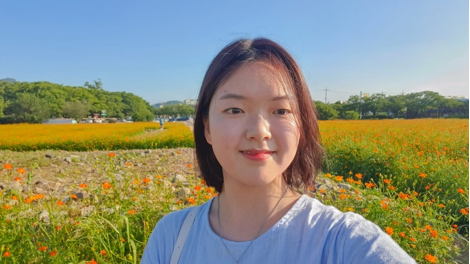 A third-year student of the Department of North Korean Studies at Dongguk University. She has worked as a program member of ‘RAILHOPE’, which is a act for reconnection TKR (Trans-Korean Railway). Last year, she worked in Peace and Public Diplomacy Corps and participated in 2020 Korea Global Peace Forum as a reporter. Her hobbies are watching movies and writing reviews.
A third-year student of the Department of North Korean Studies at Dongguk University. She has worked as a program member of ‘RAILHOPE’, which is a act for reconnection TKR (Trans-Korean Railway). Last year, she worked in Peace and Public Diplomacy Corps and participated in 2020 Korea Global Peace Forum as a reporter. Her hobbies are watching movies and writing reviews.
Fauzi Wahyu Zamzami
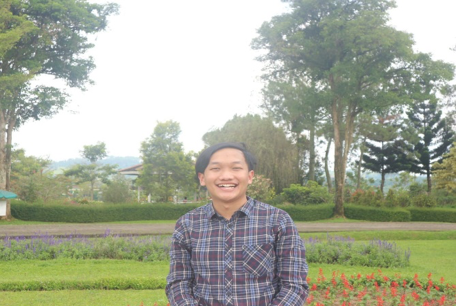 Fauzi Wahyu Zamzami, a Student of International Relations at Universitas Islam Indonesia focusing on Public Diplomacy and Global Communication. Fauzi is also the Founder and President of Indonesia Youth Foundation. Last year, He received the 2020 Most Outstanding Student Award by his Faculty. To date, He has published more than 30 articles in local and national media which main topic focused on South Korea Foreign Policy.
Fauzi Wahyu Zamzami, a Student of International Relations at Universitas Islam Indonesia focusing on Public Diplomacy and Global Communication. Fauzi is also the Founder and President of Indonesia Youth Foundation. Last year, He received the 2020 Most Outstanding Student Award by his Faculty. To date, He has published more than 30 articles in local and national media which main topic focused on South Korea Foreign Policy.
